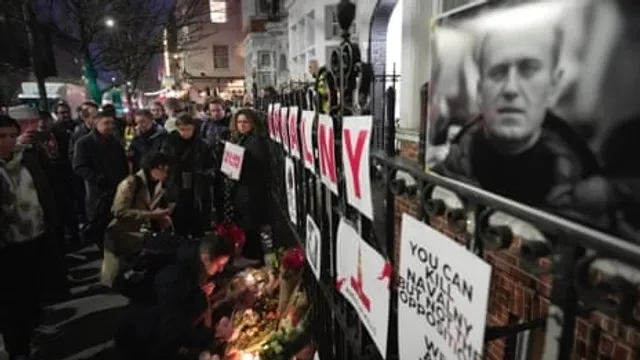Since the death of Aleksei Navalny, at least 400 individuals have been detained in Russia, according to a report by a rights group. Despite the risk of arrest, people who came to mourn Navalny found solace in the presence of others.
For the second consecutive day, mourners took purposeful walks along Moscow’s snow-covered Garden Ring on Saturday, carrying bouquets to place at impromptu memorials for Aleksei A. Navalny. The flowers, wrapped in paper to protect them from the freezing wind, served not only as symbols of mourning but also as acts of protest in a country where any form of dissent can lead to detention. Those who laid bouquets at the Wall of Grief, a monument dedicated to victims of political persecution during Stalin’s era, shared the belief that the Russian government was responsible for Navalny’s death.
“He didn’t die, he was killed,” said Alla, a 75-year-old pensioner, who chose not to provide her last name due to potential consequences. Her friend Elena, 77, who linked arms with her, added, “Theoretically, we knew they wanted to destroy him. But when it happened, it was such a shock, so senselessly brutal.” Elena discovered the news of Navalny’s death when her daughter and granddaughter tearfully called her.
Both women expressed pride in those who turned up to express their disagreement with the government, despite the widespread crackdown on dissent ever since Russian President Vladimir V. Putin launched a full-scale invasion of Ukraine almost two years ago.
While Russia’s prison service stated that Navalny suddenly fell ill during a walk and the cause of death was still being determined, Navalny’s lawyer mentioned that further testing was being done to establish the exact cause of death. In response to Navalny’s death, at least 400 people have been detained across Russia, as reported by the human rights group OVD-Info. Among those detained was a priest, Father Grigory Mikhnov-Vaitenko, who had planned to hold a memorial service for Navalny in St. Petersburg.
This recent wave of arrests marks the most significant spate since protests against a general mobilization for the war in Ukraine in September 2022.
“They try to scare us so much that it is not possible to live,” said Elena, who expressed concern for the fate of hundreds of other political prisoners in Russia.
Fear prevented Andrei, a 17-year-old high school student in 11th grade, from buying flowers, but he felt compelled to witness the events unfolding. He became defensive when a passerby mocked the mourners and questioned Navalny’s legacy.
“What did he do for our country that deserves our prayers or mourning?” said Sergei, a pensioner who only provided his first name.
“What about smart voting?” Andrei countered, referring to a system introduced by Navalny’s team in 2018 that encouraged voters to rally around one opposition candidate, in an attempt to outpoll Putin loyalists.
“He was an empty person, just a puppet of the West,” Sergei retorted.
As they conversed, numerous police officers observed and interacted with individuals at the memorial site. Additionally, a group of riot police stationed near police vans observed from a short distance away. The Wall of Grief, located on Sakharov Avenue in central Moscow and named after Nobel Prize-winning physicist Andrei Sakharov, was once used by the government to contain protest movements. However, it has also been a frequent gathering place for Navalny’s demonstrations.
For Olya, a 39-year-old individual, the abundance of flowers and candles served as a rare but important reminder that she was not alone in desiring a democratic, war-free Russia.
“During times like this, it’s crucial to see that there are people who share my thoughts,” she said while placing roses at the Wall of Grief. Previously, she had laid flowers at the Solovetsky Stone, another monument dedicated to victims of political repression, located opposite the headquarters of the F.S.B., the successor agency to the K.G.B.
“And it’s a shame that people come and go within a short period, making it impossible to see everyone who has come throughout the day, and they are constantly being asked to leave,” she lamented. “But flowers remain visible.”
Protests are effectively prohibited in Russia, and the recent arrests demonstrate the lengths to which authorities are willing to go to suppress public displays of anger or mourning.
“A responsible citizen who loves his homeland, whether forced to leave it or trying to stay to the end, possesses only one weapon – a memorial candle,” wrote Andrei Kolesnikov, a Moscow-based commentator, in an opinion piece he hopes to publish, referring to them as “the last weapon of a civilized, not savage, person and citizen.”
On Friday, videos circulated showing individuals with covered faces removing flowers from the Solovetsky Stone, interpreted as a sign that the authorities want to prevent the scale of the mourning from becoming public.
However, life in Moscow largely continued as usual, with bustling restaurants and shopping districts. Moreover, news of Navalny’s death, the impromptu memorials, and the arrests were barely mentioned in Saturday’s news broadcasts.
State-controlled television channels Rossiya24 and Rossiya-1 focused on the Munich Security Conference and Russia’s capture of Avdiivka in Ukraine, while highlighting the “Russia International Exhibit and Forum,” a patriotic exhibition celebrating the food, technology, and culture of different regions in the country.
Russian state-controlled Channel 1 only mentioned Navalny in its news bulletins three times, each time for approximately 30 seconds, without mentioning his status as a politician or the official reason for his imprisonment.
However, for many gathered in Moscow, the memories of this protest will be etched in their minds.
“Someday, what we witness here might be written in history books,” whispered Andrei, the student, as policemen urged him and a New York Times journalist to leave. Observing the constant stream of people bringing flowers and feeling the mounting pressure from a police officer to move along, Andrei slipped into an underground crosswalk before making a request.
“Please don’t forget that there are still many good people in this country,” he said.

